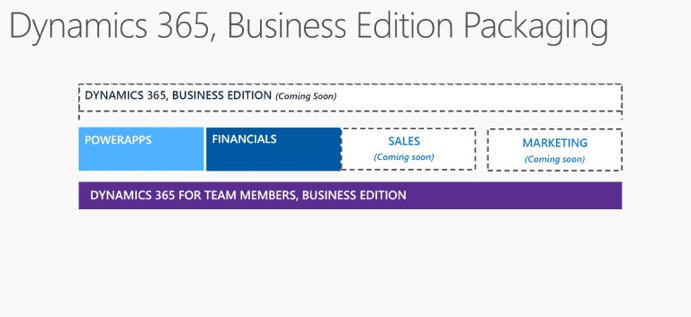By now, you will have already heard about and seen some exciting videos of the features that have been introduced. It will be an inaccurate statement to say that Dynamics 365 is a repackaged version of Dynamics CRM because it is much more than just Dynamics CRM. it now includes Operations (AX) if you choose the Enterprise Plan 2 and other significant inclusions like PowerApps and Flow. Dynamics 365 also includes Field Service, connected Field Service, and Project Service automation. With so many options and new offerings, sometimes you just want a simple answer to the question of, “What happens to my existing Dynamics CRM Online or on-premise system when the time comes for an upgrade?”
In this blog, we are going to answer some licensing questions about transitioning from Dynamics CRM to Dynamics 365. Starting November 1, 2016, Dynamics CRM Online ceased to exist for new Dynamics customers. Dynamics 365 now comes in 2 editions: Business Edition, catering to small to mid-size businesses, and the Enterprise Edition, for some medium-sized businesses to the large enterprises. In the below screenshots you can see the apps and functionality included in each of these editions.
The original Dynamics CRM is in the Enterprise edition (Plan 1). But the difference now is that CRM is offered as separate apps or as a plan (Plan 1). You can acquire CRM in a combination of apps & plans. The app licensing restricts the user to just the functionality like Sales, Service, Field Service or Project Service, whereas the plan licensing gives a user access to all the apps and more.
If you are a small business and since Microsoft hasn’t released the Business edition version of the Sales app, they are offering the Enterprise edition of Sales & Customer Service at a lower price only until those apps are released. You can take advantage of this offer through your partner and apply any discounts that are available.
If you are an existing Dynamics CRM customer, then you can transition to Dynamics 365 with a lower price point either to an App or into the Enterprise Plan 1. For most small businesses where your user count is under 100 users, your list price for the Enterprise Plan 1 is $115. With the transition pricing, you can get all the apps in the Plan 1 with a lower price and get any discounts offered by your partner. You can then renew with those prices for three years.
If you are moving from a competitor CRM, there is an offer called the Switcher Offer, that would give you an additional 20% on top of these prices. As with a lot of Microsoft product licensing it’s best to work with your Microsoft Partner who can offer a good mix of licenses to match your needs. Even if you have a small number of licenses to purchase, please consider going to your partner as they can give you discounts not published publicly.
Don’t have a partner? Contact KTL Solutions today and we will gladly make sure you are well taken care of. Call 301-360-0001 or email info@ktlsolutions.com.
[avatar user=”dvora” size=”thumbnail” align=”left” /]DAVE VORA | Senior Business Software Consultant/ CRM Lead
Dave is responsible for leading KTL’s CRM consultants, assuring that our solution scoping, architecting and delivery meet and exceed customer expectations. Dave has built lasting relationships with clients by understanding their business needs and providing value by leveraging their existing resources. Along with his consulting team, he has delivered effective solutions beyond traditional CRM constraints. Dave has more than eight years of experience in implementing business software for a variety of industries, including service, government, distribution, not-for-profit and manufacturing. He graduated with a Bachelor of Science Degree in Computer Science and also a specialization in Management from University of California at Irvine. His experience includes helping companies embrace technology to fulfill their organizational needs and creating innovative solutions using CRM, GP, Scribe and other Microsoft products.

























